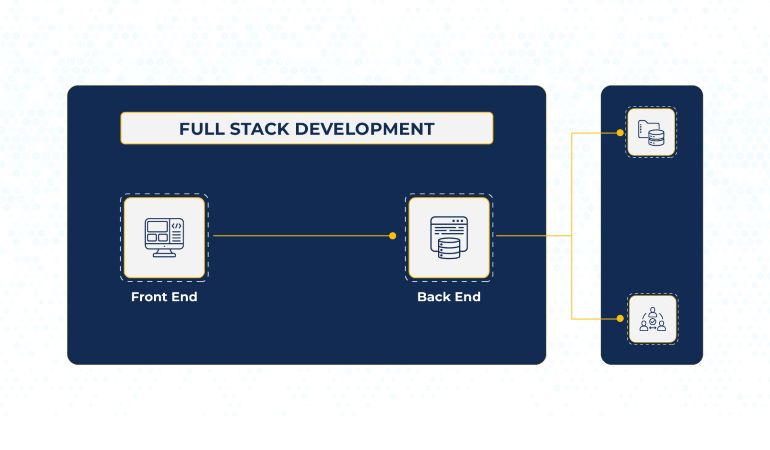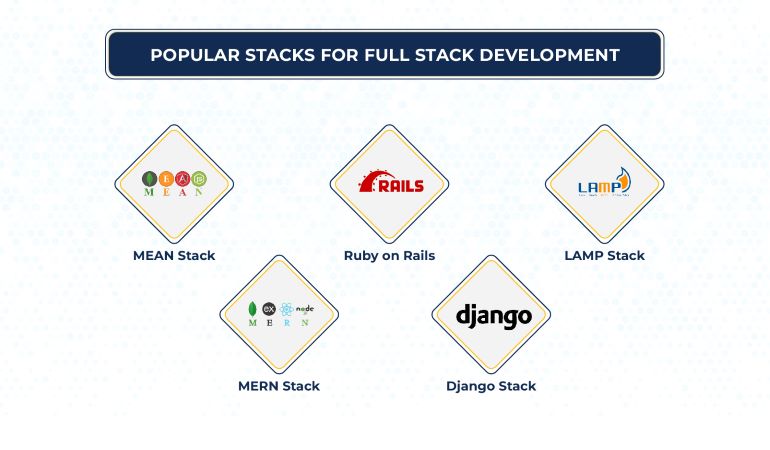Full-stack development is one of the most sought-after IT resources these days. They understand all the aspects of a software development lifecycle (SDLC), including the front-end and back-end development of applications.
The popularity of full-stack developers is primarily due to the fact that they remove the need for you to hire extra resources, thus saving money. You can develop good software without requiring more resources for the development process.
This article explains all the things you need to know about full-stack development – the necessary technical and soft skills, tech stacks, database technologies, DevOps, etc.
What is Full Stack Development?
In short, full stack development involves creating both the client-side and server-side of the application. The client side is the front-end, and the server side is the back-end. Full stack development encompasses all aspects of software development.
Developers require different skills and tools for front-end and back-end development. However, a full stack developer tech stack has everything covered to build an application from scratch.
The Two Domains of Full Stack Development
- Front-end Development: It refers to developing the graphical user interface of a website, web page, or application. Front-end developers work on how an application or software will visually look and interact with users.
- Back-end Development: Back-end developers create and work with databases to ensure that the software program functions properly.
What makes full-stack developers so capable is that they have expertise in both domains. They can address front-end, back-end, and other development-related queries adequately. Not only that, but these resources can develop complex applications from scratch. This is why they are often known as “developer generalists” – developers who understand how various technical layers interact with one another.

What Does a Full Stack Developer Do?
Full-stack developers create websites and applications for various platforms. They work on the front-end, back-end, and database of the app or website.
Major responsibilities of a full-stack developer include:
- Design, implement, and manage services and interfaces.
- Develop both front-end and back-end systems.
- Create new product functionalities or APIs.
- Conduct testing, debug software issues, and resolve bugs.
Apart from these core duties, they have to coordinate with other departments involved in the application when needed. Lastly, it is a dynamic field with new full-stack technologies coming each year, which is why upskilling is a fundamental part of a full-stack developer’s job.
Technical Skills of a Full Stack Developer
Full stack developers are creative, tech-savvy, and have pinpoint attention to detail. The following skills are required to have a career in full stack development:
-
Programming Languages
The first technical skill a full-stack developer must possess is the command of programming languages like Java, Ruby, C#, etc. Knowing each language’s syntax and how to structure, design, test, and implement its code is critical.
Below are some popular full stack development languages for each end:
- Front-end: HTML, CSS, JavaScript
- Back-end: Python, Ruby, Java, PHP, Node.js
-
Development Frameworks & Third-party Libraries
Development frameworks like Python Django, Express.js, Java Spring, Hibernate, etc., typically accompany programming languages. The knowledge of these third-party libraries and development frameworks is essential for full-stack developers.
-
Database & Cache
All software applications require a database for storage purposes. Thus, a full-stack software developer must have elementary knowledge of how databases work and how to use them conveniently. Some popular databases developers use today include Oracle, Redis, and MySQL.
A full stack database is sedu for developing the application’s back end.
-
Front-end Technology
It is equally crucial for a full-stack developer to have a proper understanding of front-end technologies. Popular front-end frameworks include React, JQuery, SASS, AngularJS, etc. Full-stack developers also possess knowledge of front-end technologies like CSS3, HTML5, and JavaScript.
-
Design Capability
Full stack development also implies that the developer is aware of designing principles and possesses skills like UX/UI designing and prototype designing.
While technical skills are a prerequisite for full-stack development, soft skills are equally crucial for optimum performance. These include, but are not limited to, the following:
- Excellent communication skills.
- A creative mindset.
- Curiosity.
- Ability to think on a global level.
- Time management and interpersonal skills.
What are the Essential Full Stack Technologies?
Back-end Architecture
- Blockchain: Blockchain platforms have added much value to application development for big players like Oracle and IBM. Some of the leading blockchain platforms include Ethereum, Hyperledger, and Hedera.
- Microservices Architecture: The microservices architectural approach helps automate business processes and develop applications as sets of loosely coupled services using lightweight protocols for communication. This approach is helpful for any software development company aiming to realize its full developmental potential.
Framework & Back-end Technologies
- Express.js: It is a back-end web app framework used to build RESTful APIs with Node.js. It is often considered the go-to framework for Node.js and is used to build APIs and web applications.
- Node.js: It is an open-source and cross-platform JavaScript runtime environment that operates on a JavaScript Engine and implements JavaScript code outside a web browser. It enables you to build scalable applications in no time.
- Python: It is a noteworthy programming language that offers multiple benefits to its users. You can use Python to develop large, customized apps since the language provides benefits like special libraries, scalability, a readable syntax, and extensibility. Moreover, Python easily interacts with other languages, enabling room for future upgrades.
- PHP: As an open-source platform, PHP allows you to design websites and prototypes quickly. It is used to develop highly interactive, user-friendly websites for companies of all sizes.
Front-end Technologies
- React.js: It is a JavaScript library popular for building interactive user interfaces. With React.js, you can offer high-quality server-side rendering.
- BootStrap: It is a front-end framework known for helping build dynamic applications and websites conveniently and quickly.
- Angular.js: Angular.js is often the go-to framework for developing mobile apps and web-based applications. It is run by Google and is known for the flexibility it provides.
- HTML/CSS: These are the fundamental building blocks used to develop and design websites. They are the cornerstones of all digital content available on the internet today.
Mobile App Development
- React Native: It is used to build software applications using JavaScript. It speeds up the development process to create mobile applications with native-like user experience.
- Cordova: It enables app developers to build a mobile app, wrap it in a framework, and deploy it to multiple mobile devices without requiring any extra effort.
- Xamarin: Many developers choose Xamarin to build high-performing cross-platform mobile apps that can be run on all three mobile operating systems – Android, iOS, and Windows.
- Kotlin: It is a statically typed, cross-platform programming language with type inference that offers full compatibility with JAVA. It has a readable syntax, and you don’t have to write as much code using it.
Database Technologies
- PostgreSQL: It is one of the most popular open-source databases today, with limitless development opportunities. You can use it to develop websites and large-scale applications.
- MySQL: It is an open-source relational database management system that allows users to tackle the challenges of the modern cloud, web, and communication services. Moreover, it doesn’t compromise uptime, scalability, and agility.
- Amazon DynamoDB: Amazon offers a NoSQL database as part of its AWS portfolio. Because it is scalable and has a flexible schema, it lets users change data structure and run queries against it.
Cloud Services
- Microsoft Azure: It offers agility and various application-building services that allow users to customize their cloud environments.
- Amazon Web Services (AWS): It is a very famous and secure cloud services platform that offers its users database storage, computing power, content delivery, deployment tools, and functional solutions. All these AWS services offer agility, reliability, scalability, and low IT costs.
- Google Cloud Platform (GCP): Run and managed by Google, the GCP offers computing, development, and storage services to users.
What is a Full Stack Developer Tech Stack?
You might wonder if full-stack technologies and a tech stack are the same. Well, not exactly. A stack is a collection of several software technologies that a full stack developer can use together for faster application development. A full-stack developer’s tech stack has its own programming language, operating system, database server, and web server.
Here are some popular stacks in full-stack development:

- LAMP Stack, which is made up of Linux, Apache, MySQL, and PHP.
- MERN Stack is composed of MongoDB, Express, ReactJS, and Node.js.
- Ruby on Rails uses Ruby, PHP, and MySQL.
- MEAN Stack uses MongoDB, Express, AngularJS, and Node.js.
- Django Stack includes Django, Python, and MySQL.
Besides the tech stacks mentioned above, a full-stack developer should know how to debug and use version control systems like GIT, Subversion, and Xdebug.
Moreover, full-stack development should be implemented through a DevOps process (a set of cultural practices and philosophies that improves efficiency) for maximum benefit.
Pros and Cons of Full Stack Development
Here are some pros and cons of full-stack development.
Pros of Full Stack Development
There are many advantages of full-stack development:
- Greater Control: Full-stack developers build the application from start to finish, giving them a complete understanding of the project. Hence, they take complete ownership of the project, have greater control, and make informed decisions in the development process.
- Faster Development: Concurrent front-end and back-end development expedites the development process. A single full-stack team can manage the workload of several processes that would take considerable time and resources if performed separately.
- Better Resource Allocation: Traditional development requires separate roles for the front-end, back-end, and server-side operations. Full-stack developers can handle all of those to make project management easier. Fewer specialized roles mean fewer resources spent, simple management, and a unified view.
Cons of Full Stack Development
There are a few disadvantages as well:
Lack of Specialization: Full-stack developers require a broad range of skills, so they may not be experts at any particular skill or tool. This lack of specific expertise causes problems when the project demands a deep understanding of some process.
Prone to Delays: Full stack development is a very demanding activity. Such applications are built using complex architecture and need intensive data processing. When requirements are not met, these technological demands can cause delays in the development process.
Work Overload: Full-stack developers deal with immense workloads. They are in charge of the entire development, which greatly stresses them. Particularly, if the full stack team is small, it becomes difficult for them to manage everything. This can affect their well-being and productivity, which is not good for them personally and the company.
Conclusion
Full-stack development is now an effective development approach within the application development industry. These developers are highly skilled and thus in great demand.
We hope this article will help you understand all the salient features of full-stack development and why you should prefer it over other options.
If you need a full-stack developer to join your team (temporarily or permanently), contact us at [email protected].

